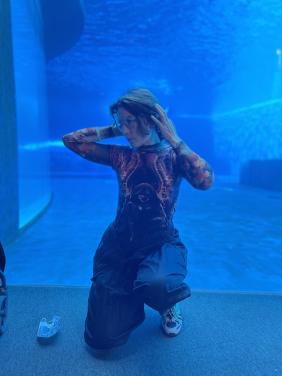
Pauline Curnier Jardin (b. 1980, Marseille, France) is a Berlin-Rome based artist working across installation, performance, film, and drawing. Her outstanding cinematic installations create unorthodox universes and tell stories, thus proposing alternative narratives. She is the winner of the 2019 German Preis der Nationalgalerie, the 2021 Villa Romana Prize in Firenze, and recipient of the 2019-2020 Villa Medici fellowship in Rome. Her work was included or commissioned over the last years in: Steirischer Herbst Festival, Graz; Manifesta 13, Marseille; Palais de Tokyo, Paris; the Bergen Assembly, Bergen Biennial; International Film Festival, Rotterdam; the 57th Venice Biennale; Tate Modern, London; Performa 15, New York.
Qu’un sang impur, 2019
HD video, 16’05’’
Courtesy: ChertLüdde Gallery and Studio Pauline Curnier Jardin
Dealing with scopophilia, and the intersection of gender with social technologies, artist Pauline Curnier Jardin often taps into the symbolism of amputation, bodily mortification and the relation between the body, the Chthonic cosmos and the social order. The gendered dimension of representation and the pornotropic gaze is also the topic of Pauline Curnier Jardin’s take on Jean Genet’s Un Chant d’Amour (1950). Her film Qu’un Sang Impur (2019) began as a loose remake of Genet’s homoerotic love story between inmates in a prison, under the yearning watch of a sadistic prison guard. In Curnier Jardin’s film, Genet’s young male bodies are replaced with post-menopausal women who invert the respective positions of predator and preyed-upon, and scramble the dichotomy between those who watch and those being watched.